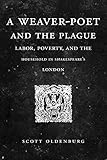A Weaver-Poet and the Plague : Labor, Poverty, and the Household in Shakespeare’s London / Scott Oldenburg.
Material type: TextSeries: Cultural Inquiries in English Literature, 1400–1700 ; 3Publisher: University Park, PA : Penn State University Press, [2021]Copyright date: ©2020Description: 1 online resource (284 p.)Content type:
TextSeries: Cultural Inquiries in English Literature, 1400–1700 ; 3Publisher: University Park, PA : Penn State University Press, [2021]Copyright date: ©2020Description: 1 online resource (284 p.)Content type: - 9780271087153
- 9780271088730
- 942.106/1 23
- online - DeGruyter
| Item type | Current library | Call number | URL | Status | Notes | Barcode | |
|---|---|---|---|---|---|---|---|
 eBook
eBook
|
Biblioteca "Angelicum" Pont. Univ. S.Tommaso d'Aquino Nuvola online | online - DeGruyter (Browse shelf(Opens below)) | Online access | Not for loan (Accesso limitato) | Accesso per gli utenti autorizzati / Access for authorized users | (dgr)9780271088730 |
Frontmatter -- Contents -- Acknowledgments -- Introduction: The Silk-Weavers’ Song -- 1. Company and Complaint: The Limits of Craft Identity -- 2. Life and Debt in the Poultry: The Communal Bonds of the Parish -- 3. Grief and Grievance: Communal Elegy in St. Olave’s Parish -- 4. The Jeremiah of Southwark: The Prophetic Poetry of William Muggins -- Epilogue: The Horizon of the Past -- Appendix: London’s Mourning Garment -- Notes -- Bibliography -- Index
restricted access online access with authorization star
http://purl.org/coar/access_right/c_16ec
William Muggins, an impoverished but highly literate weaver-poet, lived and wrote in London at the turn of the seventeenth century, when few of his contemporaries could even read. A Weaver-Poet and the Plague’s microhistorical approach uses Muggins’s life and writing, in which he articulates a radical vision of a commonwealth founded on labor and mutual aid, as a gateway into a broader narrative about London’s “middling sort” during the plague of 1603.In debt, in prison, and at odds with his livery company, Muggins was forced to move his family from the central London neighborhood called the Poultry to the far poorer and more densely populated parish of St. Olave’s in Southwark. It was here, confined to his home as that parish was devastated by the plague, that Muggins wrote his minor epic, London’s Mourning Garment, in 1603. The poem laments the loss of life and the suffering brought on by the plague but also reflects on the social and economic woes of the city, from the pains of motherhood and childrearing to anxieties about poverty, insurmountable debt, and a system that had failed London’s most vulnerable. Part literary criticism, part microhistory, this book reconstructs Muggins’s household, his reading, his professional and social networks, and his proximity to a culture of radical religion in Southwark.Featuring an appendix with a complete version of London’s Mourning Garment, this volume presents a street-level view of seventeenth-century London that gives agency and voice to a class that is often portrayed as passive and voiceless.
Mode of access: Internet via World Wide Web.
In English.
Description based on online resource; title from PDF title page (publisher's Web site, viewed 08. Aug 2023)


